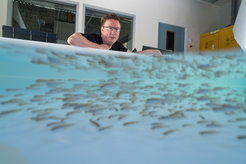Gottfried Wilhelm Leibniz-Prize for Iain Couzin
Germany's most important research award is given to MPI-AB director
Outstanding research on the "rules of the swarm": behavioural biologist Professor Iain Couzin is awarded the Gottfried Wilhelm Leibniz Prize of the German Research Foundation (DFG). The Leibniz Prize, which is awarded by the German Research Foundation (DFG), is the most important and most highly endowed research award in Germany.

His name is inextricably linked with the study of collective behaviour and swarm intelligence. He uses computer vision and sophisticated tracking methods to observe the decision-making behaviour of thousands of animals simultaneously and to investigate the "rules of the swarm". Now, Konstanz behavioural biologist Professor Iain Couzin is awarded the Gottfried Wilhelm Leibniz Prize 2022. The German Research Foundation (DFG) announced its decision on Thursday, 9 December 2021. Iain Couzin is Professor of Biodiversity and Collective Behaviour at the University of Konstanz and director of the Max Planck Institute for Animal Behavior. He is also the speaker for the Cluster of Excellence “Centre for the Advanced Study of Collective Behaviour” at the University of Konstanz.
“A flock of thousands of birds changes its direction of flight in a fraction of a second to avoid a bird of prey. The flock moves in a billowing cloud as if it were a single organism”, Iain Couzin explains his research interest. “What rules do the individuals in the collective follow to coordinate with countless others with such precision? Is there such a thing as a ‘collective mind’? How can we succeed in studying this swarm behaviour if we have to measure the behaviour of hundreds, or thousands, of animals at the same time?”
A pioneer of modern, quantitative behavioural biology
Iain Couzin's goal is to understand collective intelligence and examine the underlying mechanisms. He uses cameras, drones, GPS and motion sensors to record the behaviour of animals in swarms. To analyze the huge amounts of data, he and his team have developed computational algorithms that can calculate the movements and even the fields of vision of hundreds of individual animals in real time. This allows him to understand how information spreads in the swarm and how the individuals influence each other in their movements. In this way, Couzin was able to show that universal principles underlie collective decision-making in nature.
With his development and use of new technologies, Iain Couzin has become a pioneer in modern, quantitative behavioural biology and is known for his use of virtual reality to study animal behaviour. Individual animals are placed in ‘holographic' immersive virtual environments using photorealistic digital projections, in which the researcher can precisely control environmental factors – from the nature of the landscape, to the movements of the virtual members of the swarm and the simulation of an attack by a predator. By controlling these factors, Couzin can precisely test the behaviour of the real animal. This allows him to understand how animals sense their world, and how the interactions of the individual animals lead to the complex behaviour of the swarm.
An extraordinary researcher and independent thinker
“Iain Couzin is an extraordinary researcher, a truly autonomous and independent thinker. He sees the study of collective behaviour as an intrinsically interdisciplinary research field", says Professor Katharina Holzinger, rector of the University of Konstanz. “Iain is also an exceptional team player. With his fascination for behavioural research and his openness to interdisciplinary methods, he has succeeded in bringing together internationally leading researchers from the fields of biology, computer science, particle physics, psychology, economics and social sciences in Konstanz. We are proud to have Iain Couzin as one of the key persons at our cutting edge research centre in the field of collective behaviour, the Cluster of Excellence ‘Centre for the Advanced Study of Collective Behaviour’.”
Iain Couzin continues to drive the development of new research methods and technology, from innovative tracking techniques to computer modelling and computer vision. Recently in 2021, the new research building, Centre for Visual Computing of Collectives (VCC), was opened at the University of Konstanz. It was built with funding from the federal government, the state of Baden Württemberg and the Hector Foundation II. The building offers research technology that is unique worldwide, such as the Imaging Hangar. In this hall, which is equipped with the latest projection and tracking technology, entire animal swarms will soon be placed in virtual environments in order to research the rules of the swarm.
“Collective behaviour is a young and very dynamic field of research. I am thrilled that the work of my remarkable group has been recognized in this way. Being awarded the Gottfried Wilhelm Leibniz Prize is a deep honour. I thank the German Research Foundation for this high distinction” says Iain Couzin.
The Gottfried Wilhelm Leibniz Prize, considered the most important German research prize, is awarded annually by the DFG and endowed with 2.5 million euros.
Awards
For four consecutive years since 2018, Iain Couzin has been named in Clarivate Analytics' list of Global Highly Cited Researchers. He has received several prominent international research awards, including the 2019 Lagrange Prize, an important international accolade in the field of complex systems, the 2013 Scientific Medal of the Zoological Society of London, and the 2012 National Geographic Emerging Explorer Award. He has a large number of publications in high-profile journals such as Nature, Science and PNAS, such as “The geometry of decision-making in individuals and collectives” from 2021, “Emergent Sensing of Complex Environments by Mobile Animal Groups” from 2013 and “Uninformed individuals promote democratic consensus in animal groups” from 2011.












